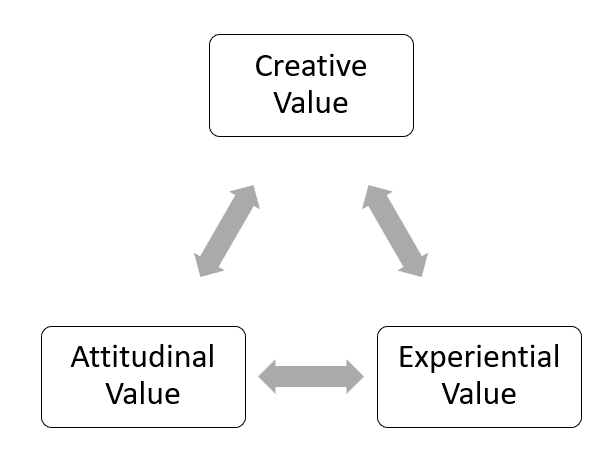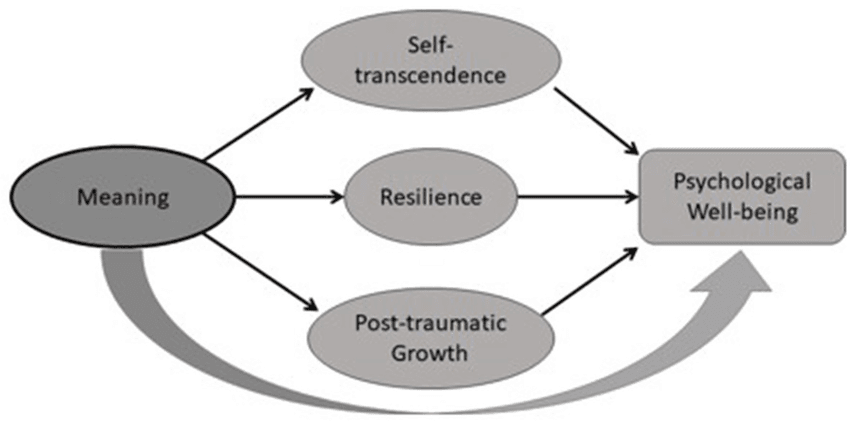Introduction of Logotherapy
What is logotherapy? Meaning : n. an approach to psychotherapy that focuses on the “human predicament,” helping the client to overcome crises in meaning.
The therapeutic process typically consists of examining three types of values-
- Creative (e.g., work, achievement)
- Experiential (e.g., art, science, philosophy, understanding, loving)
- Attitudinal (e.g., facing pain and suffering).

Values in Therapy
Each client is encouraged to arrive at his or her own solution, which should incorporate social responsibility and constructive relationships. Also called meaning-centered therapy.
Logotherapy is often referred to as the “third Viennese school of psychotherapy,” and it originated in the 1930s as a response to both Freud’s psychoanalysis and Adler’s emphasis on power within society. It is more than just “therapy.” It is a philosophy for the spiritually lost and an education for those who are confused.
Frankl viewed logotherapy as a way to enhance existing therapies by emphasizing the “meaning-dimension” or spiritual dimension of human beings. Three philosophical and psychological concepts make up Frankl’s logotherapy- freedom of will, will to meaning, and meaning of life (Batthyany, 2019).
Read More- What is Counselling
Who Was Viktor Frankl?
Viktor Frankl was an Austrian neurologist, psychiatrist, Holocaust survivor, and the founder of logotherapy, a form of existential psychotherapy focused on the search for meaning. Born in 1905 in Vienna, Frankl developed his theories under harrowing conditions, particularly during his time in Nazi concentration camps, where he observed that individuals who found purpose or meaning were more resilient, even in extreme suffering.
After surviving the Holocaust, he wrote Man’s Search for Meaning, a powerful memoir and philosophical work that explores his experiences and the principles of logotherapy. Frankl’s emphasis on the “will to meaning” as a primary human drive offers an alternative to Freud’s pleasure principle and Adler’s drive for power, marking him as a pioneer in existential psychology.

Man’s Search for Meaning
His work has had a lasting impact on psychotherapy, philosophy, and positive psychology, inspiring people worldwide to pursue lives filled with purpose and resilience.
What Does Logotherapy Explain
Speaking of today’s times, we all are facing tensions in the society and this can be an opportunity for facing reality together-the invitation to choose and enact meaning-filled behaviors that go beyond solipsism, greed, and prejudices, towards human flourishing. What is it you ultimately value with your choices should be the perspective for a healthy and positive lifestyle?
However, psychologically, logotherapy uses the specific techniques of paradoxical intention and dereflection to deal with problems of anxiety, compulsive disorders, obsessions, and phobias
Our society is not only facing crisis moments—we seem to lack words to dialogue with each other towards something beyond the problems. Indeed, our current milieu is filled with grief and loss during the COVID-19 pandemic, anger and rage at injustices re-surfacing through Black Lives Matter movement, sadness and guilt of our inhospitality towards migrants and refugees, fear and punishment to quell political discord and civil unrest, anxiousness and nihilism about general state of the ecological world… and sadly, the list goes on-and-on.
Logotherapy is a psychotherapy towards putting meaning to your life and active-change. In his earlier work, Frankl (1959) noted in “Part II: Logotherapy in a Nutshell” that logotherapy focuses on the future, on the meanings to be fulfilled by the patient. People are more concerned about other than their inner conflict as it’s a natural human tendency. Whereas, Offering good deeds, help, openness to be there for people leads to meaningful life. It also makes person valued in the society and in one’s own image of her/himself.
As a matter of fact meaning, purposes in life, people external to us and nature has always been motivating humans.
The power of one act of kindness does so much to one’s and others life.
Contours of positive life
The primary of objective of positive psychology is to derive that positive human health is not extant from medical considerations, which are not about wellness, but necessarily require a base in philosophical accounts of the good in life. To encourage and provoke people for a change of emphasis from string tendencies to consume human health as exclusively about the mind of the body toward and integrated and positive spiral of mind-body influence.
In addition positive psychology helps to understand more about biology of positive health and the impacts of it on human life, implications for making scientific agenda to help people overcome day to life situation and have fruitful future.
Techniques in Logotherapy
The main techniques used in logotherapy include paradoxical intention, dereflection, and Socratic dialogue, each of which encourages clients to explore meaning and exercise choice in their responses to life’s circumstances.
1. Paradoxical Intention- Paradoxical intention is a counterintuitive technique in which clients are encouraged to deliberately engage in the very behaviors or thoughts they are most afraid of. This method is especially effective in treating anxiety, phobias, and obsessive-compulsive disorders by disrupting the cycle of fear and avoidance. Instead of trying to avoid or control the fear (which often exacerbates it), clients are instructed to consciously confront it in an exaggerated manner.
For example, a person with social anxiety might be encouraged to deliberately say something awkward, or someone with insomnia might “try to stay awake” rather than forcing sleep. This technique helps clients change their relationship with their fear or compulsion by taking a humorous or exaggerated approach to it. By adopting this attitude, clients often experience reduced anxiety, as they no longer struggle against their fear, which decreases its power.
2. Dereflection- Dereflection shifts the client’s attention away from self-centered concerns, such as obsessive thoughts or behaviors, toward something meaningful or engaging outside themselves. This technique is useful in treating conditions that involve excessive introspection, including depression and sexual dysfunction. Clients are encouraged to focus on activities, people, or causes outside of their own issues. By directing attention outward, they can diminish the intensity of their self-focused concerns and reconnect with purposeful goals or relationships. The goal of dereflection is to reduce the client’s preoccupation with personal issues, which often creates a cycle of negative thought patterns. For example, in cases of sexual dysfunction, focusing on the partner’s needs rather than on personal performance can improve intimacy and satisfaction.
3. Socratic Dialogue (or Guided Self-Discovery)-
- It involves asking clients a series of open-ended, reflective questions designed to encourage them to explore and clarify their beliefs, values, and goals
- By guiding clients to find their own answers, this technique strengthens self-awareness and aids in discovering personal meaning.
- Through questions, the therapist encourages the client to examine and challenge their assumptions, question the purpose of their actions, and reflect on what they value most.
- For example, a therapist might ask,
- “What do you believe gives your life meaning?” or
- “How would you like to be remembered?”
- The aim is to help clients identify their values and personal sources of meaning, ultimately guiding them to live in alignment with these values.
- This technique cultivates insight into life’s purpose and encourages authentic decision-making, as clients discover answers within themselves rather than relying solely on external advice.
4. Attitudinal Modification-
- Focuses on helping clients adapt their attitudes, particularly in situations where circumstances cannot be changed (e.g., chronic illness, bereavement, or other unavoidable suffering).
- Frankl emphasized that although we cannot control certain external events, we retain the freedom to choose our attitude toward them.
- In attitudinal modification, clients are encouraged to find meaning in difficult or painful experiences by reframing their perspectives.
- This technique can involve reflecting on the values they can uphold or the lessons they can learn from hardship.
- For example, someone facing a terminal illness may focus on how to use their remaining time meaningfully or on the legacy they wish to leave.
- The purpose of attitudinal modification is to cultivate resilience by helping clients see suffering as an opportunity for growth or personal development.
- This approach teaches individuals that while suffering is often unavoidable, it can be endured with dignity and meaning.
5. Self-Transcendence-
It involves moving beyond self-interest to serve something greater, such as a cause, another person, or a meaningful goal.
Frankl argued that self-transcendence is essential to achieving lasting happiness and fulfillment.
Clients are encouraged to find ways to connect with others, contribute to society, or pursue causes that align with their values.
This approach shifts the focus from self-centered concerns to the well-being of others, fostering a greater sense of belonging and purpose.
The goal is to help individuals break free from the limitations of self-centered thinking and engage with the world in a meaningful way.
Frankl believed that true fulfillment comes from transcending personal needs and contributing to the greater good.

Techniques in Logotherapy (Russo-Netzer & Ameli, 2021)
Logotherapy’s techniques—paradoxical intention, dereflection, Socratic dialogue, attitudinal modification, and self-transcendence—equip individuals to face life’s challenges with purpose and resilience. Each method supports the client’s search for meaning by addressing the roots of psychological distress and encouraging positive, purposeful action. Together, these techniques underscore logotherapy’s foundational belief: that meaning, not avoidance of discomfort or pursuit of pleasure, is the ultimate driver of human fulfillment.
Read More- What is Mindfulness
Mindfulness and Well-being
Mindfulness goes hand in hand with wellbeing- paying attention to our surrounding and being aware of the situation, more aware of our thoughts and feelings so that we are able to control our emotions and not be confused or overwhelmed.
Practicing healthy lifestyle like meditating, yoga, breathing, help our psychological and cognitive mechanisms to lead to mental and physical well-being. However, there is proved research about how and why mindfulness helps an individual to have more attention regulation, less distraction and decentering.
Based on my personal experience – As diagnosed with a medical condition, I started to adopt healthy lifestyle. I started meditating, yoga, exercises, heathy food, and I have seen that it created a positive shift in my life. I also think engaging in mindfulness activity is a practical way to elicit psychological and physical well-being.
References
Batthyany, A. (2019). What is logotherapy/existential analysis? Logotherapy and existential analysis. Viktor Frankl Institut. Retrieved from https://www.viktorfrankl.org/logotherapy.html
Frankl, V. E. (2006). Man’s search for meaning. Beacon Press.
Lewis, M. H. (2011). Defiant power: An overview of Viktor Frankl’s logotherapy and existential analysis. Retrieved June 19, 2020, from www.defiantpower.com
Frankl, V. E. (2014). The will to meaning: Foundations and applications of logotherapy (Expanded ed.). Plume
Fabry, J. B. (1995). Finding meaning in life: Logotherapy. Jason Aronson
Ryff, C., & Singer, B. (1998). The Contours of Positive Human Health. Psychological Inquiry, 9(1), 1-28. Retrieved May 11, 2021, from http://www.jstor.org/stable/1449605
Psychological Inquiry 9, No. 1 (1998), pp. 1-28 (28 pages) Published By: Taylor & Francis, Ltd.
Russo-Netzer, P., & Ameli, M. (2021). Optimal sense-making and resilience in times of pandemic: Integrating rationality and meaning in psychotherapy. Frontiers in psychology, 12, 645926.
Chicago
Subscribe to Careershodh
Get the latest updates and insights.
Join 18,526 other subscribers!
Niwlikar, B. A. (2021, June 19). What is Logotherapy With 5 Important Techniques Used. Careershodh. https://www.careershodh.com/what-is-logotherapy/
